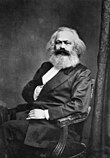
Back قوى عاملة (ماركسية) Arabic İşçi qüvvəsi Azerbaijani Работническа сила Bulgarian Força de treball Catalan Arbejdskraft Danish Arbeitskraft German Laborforto Esperanto Fuerza de trabajo Spanish Lan-indar Basque Force de travail French
This article possibly contains original research. (July 2019) |
| Part of a series on |
| Marxism |
|---|
 |
| Part of a series on |
| Marxian economics |
|---|
 |
Labour power (German: Arbeitskraft; French: force de travail) is the capacity to do work, a key concept used by Karl Marx in his critique of capitalist political economy. Marx distinguished between the capacity to do work, i.e. labour power, and the physical act of working, i.e. labour.[1] Labour power exists in any kind of society, but on what terms it is traded or combined with means of production to produce goods and services has historically varied greatly.[citation needed]
Under capitalism, according to Marx, the productive powers of labour appear as the creative power of capital. Indeed, "labour power at work" becomes a component of capital, it functions as working capital. Work becomes just work, workers become an abstract labour force, and the control over work becomes mainly a management prerogative.
- ^ Fine, Ben; Saad-Filho, Alfredo (2010). Marx's Capital (5th ed.). London: Pluto Press. p. 20. ISBN 978-0-7453-3016-7.
© MMXXIII Rich X Search. We shall prevail. All rights reserved. Rich X Search